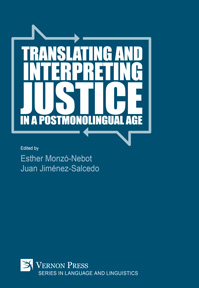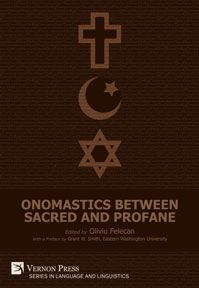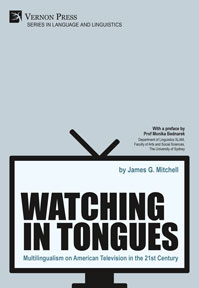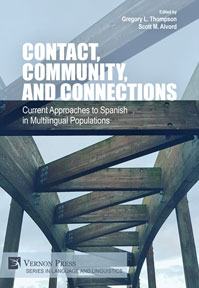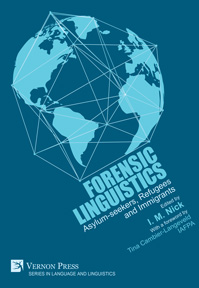Lingüística del castellano chileno / Chilean Spanish Linguistics
Estudios sobre variación, innovación, contacto e identidad / Studies on variation, innovation, contact, and identity
Brandon M. A. Rogers, Mauricio A. Figueroa Candia (Eds.)
by José A. Martínez-Lara (Universidad Central de Venezuela, Venezuela), Gastón Salamanca (Universidad de Concepción, Chile), Miguel Ramos (Universidad de O’Higgins, Chile), Karen Miller (The Pennsylvania State University), Verónica González Temer (Universidad Metropolitana de Ciencias de la Educación, Chile), Víctor Fernández-Mallat (Georgetown University)... , Tabea Krebs (Universität Bern, Switzerland), Darío Rojas (Universidad de Chile, Chile), Tania Avilés (The City University of New York), Natalia Villarroel (The City University of New York), Mariška Bolyanatz (Occidental College), Darío A. Fuentes Grandón (University of Bristol), Macarena Céspedes (Universidad Alberto Hurtado, Chile), Edgardo Cifuentes (Universidad Católica de la Santísima Concepción, Chile), Christina Haska (Universidad Adolfo Ibáñez, Chile), Pablo Camus (Soka University of America), Silvana Guerrero González (Universidad de Chile, Chile), Carlos González Vergara (Pontificia Universidad Católica de Chile, Chile), Abelardo San Martín Núñez (Universidad de Chile, Chile), Sascha Gaglia (Georg-August-Universität Göttingen; Freie Universität Berlin, Germany), Scott Sadowsky (Pontificia Universidad Católica de Chile, Chile; Max Planck Institute for the Science of Human History, Germany), Maryann Parada (California State University Bakersfield), Aldo Olate Vinet (Universidad de La Frontera, Chile), Ricardo Pineda Carrasco (Universidad de Chile, Chile), Iván Ortega-Santos (University of Memphis), Karina Cerda-Oñate (Universidad de Talca, Chile), Francisco Antonio Nocetti (Universidad de Concepción, Chile), Gloria Toledo Vega (Pontificia Universidad Católica de Chile, Chile), Hernán Emilio Pérez (Universidad de Concepción, Chile), Bronwen G. Evans (University College London) Show more
Purchase this book
(click here to change currency)
El libro contiene 19 capítulos que abordan en español e inglés análisis del español de Chile con una visión variacionista sobre la base de una Concepción sociolingüista y predominantemente normativa.
En términos generales, el libro informa sobre estudios del español de Chile con una mirada predominantemente empírica y, en algunos casos, con estudios que analizan la visión del español desde una mirada más ensayística, como es el caso del capítulo 6.
[…]
En términos generales, los capítulos aportan con una mirada prolija el fenómeno de la variación del español de Chile en diferentes dimensiones con un énfasis en los estudios socio-fonéticos. Se trata de un real aporte a los estudios lingüísticos y descriptivos del español de Chile en diferentes contextos de habla y en distintas circunstancias.
Dra. Mónica Tapia Ladino
Vicerrectora de Investigación y Postgrado
Universidad Católica de la Santísima Concepción, Chile
Ya desde el siglo XIX, el castellano chileno generó interés en lingüistas como Lenz (1891), quien lo aclamó como un geolecto dinámico y en constante evolución. Más recientemente, un grupo importante de lingüistas contemporáneos ha indicado que existe una gran cantidad de diferencias entre el castellano de Chile y otras variedades en varios frentes lingüísticos; tanto es así que debería considerarse como una zona dialectal independiente en el mundo hispanohablante. Su interés como caso práctico se ve reforzado por la incongruencia del grado particularmente alto de variación social y el menor grado de su variación geográfica.
Lingüística del castellano chileno: Estudios sobre variación, innovación, contacto e identidad es el primer volumen de su tipo, y reúne el trabajo de un grupo diverso e internacional de investigadores e investigadoras del castellano de Chile. Mediante el uso ... de métodos, teorizaciones y análisis lingüísticos actuales, este volumen examina cómo el uso, la variación, las actitudes, la identidad y el cambio lingüístico se manifiestan de manera única en diferentes aspectos del castellano chileno y sus hablantes. Este volumen, que acerca el trabajo más actual sobre la lingüística española de Chile a la vanguardia del campo, constituye un recurso valioso para aquellos involucrados en la investigación y la enseñanza de la lingüística, la variación y el cambio lingüístico del castellano, así como para estudiantes de grado y posgrado.
As early as the 19th century, Chilean Spanish attracted the interest of linguists such as Lenz (1891), who hailed it as an evolving and vibrant variety. In more recent times, a number of contemporary linguists have indicated that such a variety of differences exist between Chilean Spanish and other varieties on a number of linguistic fronts, that it should be considered as an independent dialectal zone in the Spanish-speaking world. Its interest as a case study is reinforced further by the incongruence of the particularly high degree of social variation and the small degree of geographical variation.
Chilean Spanish Linguistics: Studies on variation, innovation, contact, and identity is the first of its kind, bringing together the work of a diverse and international group of researchers on Chilean Spanish. Through the use of current linguistic methods, theorization, and analyses, this volume examines how language usage, variation, attitudes, identity, and change are uniquely manifested in different aspects of Chilean Spanish and its speakers. Bringing the most current work on Chilean Spanish linguistics to the forefront of the field, this volume will be a valuable resource to all involved in the research and teaching of Spanish language linguistics, language variation, and change, as well as undergraduate and graduate students alike. Show more
Lista de figuras / List of figures
Lista de tablas / List of tables
Prólogo / Preface
Carol A. Klee
Universidad de Minnesota
Introducción / Introduction
Brandon M. A. Rogers
Texas Tech University
Mauricio A. Figueroa Candia
Universidad de Concepción
Sección uno: percepción, adquisición y actitudes / Section one: perception, acquisition, and attitudes
Chapter 1 ¿Y tú voseái?: actitudes de jóvenes santiaguinos frente al voseo mixto chileno
Ch... ristina Haska
Universidad Adolfo Ibáñez
Chapter 2 Perception of lenited Chilean Spanish approximants: implications for lexical access models
Mauricio A. Figueroa Candia
Universidad de Concepción
Bronwen G. Evans
University College London
Chapter 3 Acquisition of variation in Chilean Spanish: /s/ lenition in children and their mothers
Miguel Ramos
Universidad de O’Higgins
Karen Miller
The Pennsylvania State University
Chapter 4 De elementos cuasi-léxicos a malas palabras: un estudio interaccional
Verónica González Temer
Universidad Metropolitana de Ciencias de la Educación
Chapter 5 Representaciones sociomentales de hablantes del español chileno en la ciudad de Concepción
Víctor Fernández-Mallat
Georgetown University
Tabea Krebs
Universität Bern
Chapter 6 El orden de la lengua: la formación de un imaginario sobre el castellano en Chile
Darío Rojas
Universidad de Chile
Tania Avilés
The City University of New York
Natalia Villarroel
The City University of New York
Sección dos: variación social y cambio / Section two: social variation and change
Chapter 7 A sociophonetic account of coda liquid neutralization in Santiago Spanish
Mariška Bolyanatz
Occidental College
Chapter 8 Evidence of dialectal divergence in the vowel system of Chilean Spanish
Mauricio A. Figueroa Candia
Universidad de Concepción
Brandon M. A. Rogers
Texas Tech University
Darío A. Fuentes Grandón
University of Bristol
Chapter 9 La entonación del español hablado en localidades rurales de la zona central de Chile
Macarena Céspedes
Universidad Alberto Hurtado
Chapter 10 Procesos fonológicos como detonantes de innovación léxico-semántica en el español de Chile
Edgardo Cifuentes
Universidad Católica de la Santísima Concepción
Gastón Salamanca
Universidad de Concepción
Chapter 11 (Yo) opino: la variación del sujeto pronominal en el habla de Santiago de Chile
José A. Martínez-Lara
Universidad Central de Venezuela
Silvana Guerrero González
Universidad de Chile
Carlos González Vergara
Pontificia Universidad Católica de Chile
Chapter 12 La variación de los marcadores del discurso en el español hablado en Santiago de Chile
Abelardo San Martín Núñez
Universidad de Chile
Chapter 13 Interfaces gramaticales en el sistema de tratamiento pronominal de Chile
Sascha Gaglia
Georg-August-Universität Göttingen; Freie Universität Berlin
Chapter 14 EMIS: Sistema de estratificación socioeconómica para la investigación lingüística
Scott Sadowsky
Pontificia Universidad Católica de Chile; Max Planck Institute for the Science of Human History
Sección tres: castellano chileno en una sociedad multilingüe y global / Section three: Chilean Spanish in a multilingual and global society
Chapter 15 Language and dialect contact in the Chilean diaspora of Sweden
Maryann Parada
California State University Bakersfield
Chapter 16 La concordancia de género en el castellano hablado por bilingües mapuzugun-castellano
Aldo Olate Vinet
Universidad de La Frontera
Ricardo Pineda Carrasco
Universidad de Chile
Chapter 17 Dialect distance and data assessment in Chilean, Venezuelan and Puerto Rican Spanish
Iván Ortega-Santos
University of Memphis
Chapter 18 El habla sincronizada como dispositivo para la producción del ritmo del español como L2
Karina Cerda-Oñate
Universidad de Talca
Francisco Antonio Nocetti
Universidad de Concepción
Gloria Toledo Vega
Pontificia Universidad Católica de Chile
Hernán Emilio Pérez
Universidad de Concepción
Chapter 19 Estudiantes de intercambio y su grado de conocimiento del voseo chileno
Pablo Camus
Soka University of America
Acrónimos / Acronyms
Índice / Index Show more
Brandon M. A. Rogers es profesor asistente en la Texas Tech University, Texas (EE. UU.), y se doctoró en Lingüística Española en la University of Minnesota (EE. UU.). El Dr. Rogers se especializa en fonética, fonología, prosodia, sociolingüística y contacto entre lenguas. Sus publicaciones recientes reflejan estos intereses, ya que han versado sobre variación sociofonética y prosódica en Chile, así como la influencia del quechua en la variación sociolingüística en Lima (Perú), y la influencia del mapundugun en la entonación del castellano chileno. También ha investigado y publicado sobre el co... ntacto entre lenguas y variación fonética en el castellano cubano de Miami y el inglés. El Dr. Rogers se encuentra actualmente investigando y documentando la prosodia del mapundungun, al igual que continuando sus estudios sobre la variación sociofonética y prosódica en Chile y Perú.
Mauricio A. Figueroa Candia es profesor asistente en la Universidad de Concepción (Chile). Obtuvo su doctorado en fonética experimental en University College London (Reino Unido) y se especializa en fonética, sociolingüística y etnolingüística, con énfasis en la aplicación de métodos experimentales para investigar problemas de los niveles fonéticos y fonológicos. Las publicaciones del Dr. Figueroa Candia incluyen estudios sobre la variación sociofonética del sistema consonántico del castellano chileno y análisis que explican controversias fonológicas de las lenguas vernáculas de Chile. Actualmente, se encuentra investigando la variación social en los sistemas vocálicos del castellano chileno, la variabilidad geográfica y el ritmo del castellano chileno, y aspectos segmentales y suprasegmentales del mapundungun. El Dr. Figueroa Candia ha recibido financiación para estudiar la fonética y la fonología del kawésqar, una lengua aislada del extremo sur de la Patagonia (Chile).
Brandon M. A. Rogers is currently an assistant professor of Spanish Linguistics and Language at Ball State University in Muncie, Indiana, and received his Ph.D. in Hispanic Linguistics from the University of Minnesota (US). Dr Rogers’s specialties are in the fields of phonetics, phonology, prosody, sociolinguistics and language contact. In line with this, his recent publications include work on sociophonetic and prosodic variation in Chile, as well as the influence of Quechua on sociolinguistic variation in Lima, Peru, and the influence of Mapudungun on Chilean Spanish intonation. He has also investigated and published work on language contact and phonetic variation in Miami-Cuban Spanish and English. Rogers is investigating and documenting the prosody of Mapudungun, as well as continuing his investigation on sociophonetic and prosodic variation in Chile and Peru.
Mauricio A. Figueroa Candia is an assistant professor of Experimental Phonetics at Universidad de Concepción, Chile. He graduated with his Ph.D. in Speech, Hearing and Phonetic Sciences from University College London (UK) and specializes in phonetics, sociolinguistics, and ethnologies; with a focus on the application of experimental methods to solve research questions about the phonetic and phonemic levels. Dr Figueroa Candia’s publications include studies on the sociophonetic variation of the Chilean Spanish consonant system and studies that shed new light on phonological controversies of Chilean vernacular languages. He is currently investigating social variation in the vowel system(s) of Chilean Spanish, geographical variability and rhythm in Chilean Spanish, and segmental and suprasegmental aspects of Mapudungun. Figueroa Candia has secured funding to study phonetics and phonology of Kawésqar, a language isolate spoken in the far south of Chile (Patagonia). Show more
Chilean Spanish, Phonetics, Phonology, Morphosyntax, Syntax, Prosody, Intonation, Psycholinguistics, Language contact, Sociolinguistics, Language attitudes, Language Identity, Indigenous languages, Mapudungun, Optimality Theory
See also
Bibliographic Information
Book Title
Lingüística del castellano chileno / Chilean Spanish Linguistics
Book Subtitle
Estudios sobre variación, innovación, contacto e identidad / Studies on variation, innovation, contact, and identity
ISBN
978-1-64889-298-1
Edition
1st
Number of pages
591
Physical size
236mm x 160mm

![Lingüística del castellano chileno / Chilean Spanish Linguistics [Paperback]](/file/15078/d98844caa2488dac894a5568dc31d118/1625646454.jpg)

